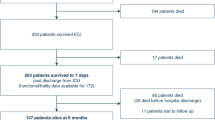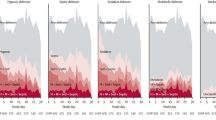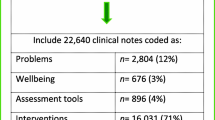Abstract
Purpose
Critical illness is associated with long-term increased mortality and impaired quality of life (QoL). We assessed whether multidisciplinary consultations would improve outcome at 12 months (M12) after intensive care unit (ICU) discharge.
Methods
We performed an open, multicenter, parallel-group, randomized clinical trial. Eligible are patients discharged alive from ICU in 11 French hospitals between 2012 and 2018. The intervention group had a multidisciplinary face-to-face consultation involving an intensivist, a psychologist, and a social worker at ICU discharge and then at M3 and M6 (optional). The control group had standard post-ICU follow-up. A consultation was scheduled at M12 for all patients. The QoL was assessed using the EuroQol-5 Dimensions-5 Level (Euro-QoL-5D-5L) which includes five dimensions (mobility, self-care, usual activities, pain, and anxiety/depression), each ranging from 1 to 5 (1: no, 2: slight, 3: moderate, 4: severe, and 5: extreme problems). The primary endpoint was poor clinical outcome defined as death or severe-to-extreme impairment of at least one EuroQoL-5D-5L dimension at M12. The information was collected by a blinded investigator by phone. Secondary outcomes were functional, psychological, and cognitive status at M12 consultation.
Results
540 patients were included (standard, n = 272; multidisciplinary, n = 268). The risk for a poor outcome was significantly greater in the multidisciplinary group than in the standard group [adjusted odds ratio 1.49 (95% confidence interval, (1.04–2.13)]. Seventy-two (13.3%) patients died at M12 (standard, n = 32; multidisciplinary, n = 40). The functional, psychological, and cognitive scores at M12 did not statistically differ between groups.
Conclusions
A hospital-based, face-to-face, intensivist-led multidisciplinary consultation at ICU discharge then at 3 and 6 months was associated with poor outcome 1 year after ICU.


Similar content being viewed by others
Availability of data and materials
Data available: yes. Data types: de-identified participant data. How to access data: de-identified patient data to reproduce results presented in the article. When available: with publication. Document types: none. Who can access the data: researchers whose proposed use of the data have been approved. Types of analyses: research projects with the same scientific purpose as the original study (post-intensive care follow-up), such as meta-analysis, for instance. Mechanisms of data availability: data will be made available upon approval of a proposal, and after a signed data access agreement with the trial sponsor. Any additional restrictions: none.
References
Herridge MS, Azoulay É. Outcomes after Critical Illness. New England Journal of Medicine 2023; published online March 8. DOI:https://doi.org/10.1056/NEJMra2104669.
Gayat E, Cariou A, Deye N et al (2018) Determinants of long-term outcome in ICU survivors: results from the FROG-ICU study. Crit Care 22:8
Granja C, Teixeira-Pinto A, Costa-Pereira A (2002) Quality of life after intensive care–evaluation with EQ-5D questionnaire. Intensive Care Med 28:898–907
Brooks R, Kerridge R, Hillman K, Bauman A, Daffurn K (1997) Quality of life outcomes after intensive care. Comparison with a community group. Intensive Care Med 23:581–586
Beumeler LFE, van Wieren A, Buter H et al (2020) Patient-reported physical functioning is limited in almost half of critical illness survivors 1-year after ICU-admission: A retrospective single-centre study. PLoS ONE 15:e0243981
Puthucheary ZA, Gensichen JS, Cakiroglu AS et al (2020) Implications for post critical illness trial design: sub-phenotyping trajectories of functional recovery among sepsis survivors. Crit Care 24:577
Shima N, Miyamoto K, Shibata M et al (2020) Activities of daily living status and psychiatric symptoms after discharge from an intensive care unit: a single-center 12-month longitudinal prospective study. Acute Med Surgery 7:e557
Yende S, Austin S, Rhodes A et al (2016) Long-Term Quality of Life Among Survivors of Severe Sepsis: Analyses of Two International Trials. Crit Care Med 44:1461–1467
Needham DM, Dinglas VD, Morris PE et al (2013) Physical and cognitive performance of patients with acute lung injury 1 year after initial trophic versus full enteral feeding. EDEN trial follow-up. Am J Respir Crit Care Med 188:567–576
Righy C, Rosa RG, da Silva RTA et al (2019) Prevalence of post-traumatic stress disorder symptoms in adult critical care survivors: a systematic review and meta-analysis. Crit Care 23:213
Hatch R, Young D, Barber V, Griffiths J, Harrison DA, Watkinson P (2018) Anxiety, Depression and Post Traumatic Stress Disorder after critical illness: a UK-wide prospective cohort study. Crit Care 22:310
Lund-Sørensen H, Benros ME, Madsen T et al. (2016) A Nationwide Cohort Study of the Association Between Hospitalization With Infection and Risk of Death by Suicide. JAMA Psychiat 73:912–919
Honarmand K, Lalli RS, Priestap F et al. (2020) Natural History of Cognitive Impairment in Critical Illness Survivors. A Systematic Review. Am J Respir Crit Care Med 202:193–201
Iwashyna TJ, Ely EW, Smith DM, Langa KM (2010) Long-term cognitive impairment and functional disability among survivors of severe sepsis. JAMA 304:1787–1794
Pandharipande PP, Girard TD, Jackson JC et al (2013) Long-Term Cognitive Impairment after Critical Illness. N Engl J Med 369:1306–1316
Needham DM, Dinglas VD, Bienvenu OJ et al (2013) 1 year outcomes in patients with acute lung injury randomised to initial trophic or full enteral feeding: prospective follow-up of EDEN randomised trial. BMJ 346:f1532
Marra A, Pandharipande PP, Girard TD et al (2018) Co-occurrence of Post-Intensive Care Syndrome Problems Among 406 Survivors of Critical Illness. Crit Care Med 46:1393–1401
Rosa RG, Falavigna M, Robinson CC et al (2020) Early and Late Mortality Following Discharge From the ICU: A Multicenter Prospective Cohort Study. Crit Care Med 48:64–72
Wong EG, Parker AM, Leung DG, Brigham EP, Arbaje AI (2016) Association of severity of illness and intensive care unit readmission: A systematic review. Heart Lung 45:3-9.e2
Ponzoni CR, Corrêa TD, Filho RR et al (2017) Readmission to the Intensive Care Unit: Incidence, Risk Factors, Resource Use, and Outcomes. A Retrospective Cohort Study Annals ATS 14:1312–1319
Inoue S, Hatakeyama J, Kondo Y et al (2019) Post-intensive care syndrome: its pathophysiology, prevention, and future directions. Acute Med Surgery 6:233–246
Kaushik R, Ferrante LE (2022) Long-term recovery after critical illness in older adults. Curr Opin Crit Care 28:572–580
Schmidt K, Worrack S, Von Korff M et al (2016) Effect of a Primary Care Management Intervention on Mental Health-Related Quality of Life Among Survivors of Sepsis: A Randomized Clinical Trial. JAMA 315:2703
Jones C, Skirrow P, Griffiths RD et al (2003) Rehabilitation after critical illness: a randomized, controlled trial. Crit Care Med 31:2456–2461
Douglas SL, Daly BJ, Kelley CG, O’Toole E, Montenegro H (2007) Chronically critically ill patients: health-related quality of life and resource use after a disease management intervention. Am J Crit Care 16:447–457
Schofield-Robinson OJ, Lewis SR, Smith AF, McPeake J, Alderson P (2018) Follow-up services for improving long-term outcomes in intensive care unit (ICU) survivors. Cochrane Database Syst Rev. https://doi.org/10.1002/14651858.CD012701.pub2
Walsh TS, Salisbury LG, Merriweather JL et al (2015) Increased Hospital-Based Physical Rehabilitation and Information Provision After Intensive Care Unit Discharge: The RECOVER Randomized Clinical Trial. JAMA Intern Med 175:901
Rosa RG, Ferreira GE, Viola TW et al (2019) Effects of post-ICU follow-up on subject outcomes: A systematic review and meta-analysis. J Crit Care 52:115–125
Friedman D, Grimaldi L, Cariou A et al (2022) Impact of a Postintensive Care Unit Multidisciplinary Follow-up on the Quality of Life (SUIVI-REA): Protocol for a Multicenter Randomized Controlled Trial. JMIR Research Protocols 11:e30496
Chevalier J, de Pouvourville G (2013) Valuing EQ-5D using Time Trade-Off in France. Eur J Health Econ 14:57–66
Phyo AZZ, Freak-Poli R, Craig H et al (2020) Quality of life and mortality in the general population: a systematic review and meta-analysis. BMC Public Health 20:1596
Granja C, Dias C, Costa-Pereira A, Sarmento A (2004) Quality of life of survivors from severe sepsis and septic shock may be similar to that of others who survive critical illness. Crit Care 8:R91-98
Boelens YFN, Melchers M, van Zanten ARH (2022) Poor physical recovery after critical illness: incidence, features, risk factors, pathophysiology, and evidence-based therapies. Curr Opin Crit Care 28:409–416
Cuthbertson BH, Rattray J, Campbell MK et al (2009) The PRaCTICaL study of nurse led, intensive care follow-up programmes for improving long term outcomes from critical illness: a pragmatic randomised controlled trial. BMJ 339:b3723
Elliott D, McKinley S, Alison J et al (2011) Health-related quality of life and physical recovery after a critical illness: a multi-centre randomised controlled trial of a home-based physical rehabilitation program. Crit Care 15:R142
Jackson JC, Ely EW, Morey MC et al (2012) Cognitive and physical rehabilitation of intensive care unit survivors: Results of the RETURN randomized controlled pilot investigation. Crit Care Med 40:1088–1097
Jones C, Eddleston J, McCairn A et al (2015) Improving rehabilitation after critical illness through outpatient physiotherapy classes and essential amino acid supplement: A randomized controlled trial. J Crit Care 30:901–907
McDowell K, O’Neill B, Blackwood B et al (2017) Effectiveness of an exercise programme on physical function in patients discharged from hospital following critical illness: a randomised controlled trial (the REVIVE trial). Thorax 72:594–595
McWilliams DJ, Benington S, Atkinson D (2016) Outpatient-based physical rehabilitation for survivors of prolonged critical illness: A randomized controlled trial. Physiother Theory Pract 32:179–190
Jensen JF, Egerod I, Bestle MH et al (2016) A recovery program to improve quality of life, sense of coherence and psychological health in ICU survivors: a multicenter randomized controlled trial, the RAPIT study. Intensive Care Med 42:1733–1743
Chao P, Shih C-J, Lee Y-J et al (2014) Association of Postdischarge Rehabilitation with Mortality in Intensive Care Unit Survivors of Sepsis. Am J Respir Crit Care Med 190:1003–1011
Kentish-Barnes N, Chevret S, Champigneulle B et al (2017) Effect of a condolence letter on grief symptoms among relatives of patients who died in the ICU: a randomized clinical trial. Intensive Care Med 43:473–484
Griffith DM, Salisbury LG, Lee RJ et al (2018) Determinants of Health-Related Quality of Life After ICU: Importance of Patient Demographics, Previous Comorbidity, and Severity of Illness. Crit Care Med 46:594–601
McClure NS, Sayah FA, Xie F, Luo N, Johnson JA (2017) Instrument-Defined Estimates of the Minimally Important Difference for EQ-5D-5L Index Scores. Value Health 20:644–650
Acknowledgements
The authors thank the members of the data and safety monitoring board (Nawal Derridj-Ait-Younes, Nabila Yasmine Domingo-Saidji, Abderraouf Hermez, Sonia Krim, Chanez Lazizi, Layidé Méaude, Karima Mesbahi, and Sonia Ouali) and Philippe Aegerter for his support and advice in the early stages of the trial, and the trial participants who were willing to be randomly assigned to either a standard follow-up or a multidisciplinary consultations. The authors also thank Fiona Caulfield and Clara Delplancke for their careful reading of the manuscript.
The authors are grateful to the investigators of all participating centers: Djilali Annane (Réanimation Médico-Chirurgicale, Hôpital Raymond Poincaré, 104 Boulevard Raymond Poincaré, 92380 Garches, France), Abdel Ben Salah (Réanimation Médico-Chirurgicale, Centre Hospitalier, 28000, Chartres, France), Camille Bernard (Réanimation Médicale, Hôpital Bichat, 46 rue Henri Huchard, 75018 Paris, France), Lila Bouadma (Réanimation Médicale, Hôpital Bichat, 46 rue Henri Huchard, 75018 Paris, France), Alain Cariou (Réanimation Médicale, 27, rue du Faubourg Saint-Jacques, 75014 Paris), Benoît Champigneulle (Réanimation Médicale, 27, rue du Faubourg Saint-Jacques, 75014 Paris, France), Bernard Cholley (Anesthésie-Réanimation, Hôpital Européen George Pompidou, 75015, Paris, France), Bernard Clair (Réanimation Médico-Chirurgicale, Hôpital Raymond Poincaré, 104 Boulevard Raymond Poincaré, 92380 Garches, France), Fabrice Daviaud (Réanimation Médicale, 27, rue du Faubourg Saint-Jacques, 75014 Paris, France), Estelle Doré (Réanimation Polyvalente, Centre Hospitalier Sud-Essonne, 26 avenue du Général de Gaulle, Etampes, 91150 France), Vincent Deiler (Réanimation Médicale, Hôpital Bichat, 46 rue Henri Huchard, 75018 Paris, France), Mélanie Escoffier (Réanimation Polyvalente, Centre Hospitalier Sud-Essonne, 26 avenue du Général de Gaulle, Etampes, 91150 France), Alexis Ferré (Réanimation Médicale, 27, rue du Faubourg Saint-Jacques, 75014 Paris, France), Stéphane Gaudry (Réanimation Médico-Chirurgicale, Hôpital Louis Mourier, 92700, Colombes, France), Louis Marie Galerneau (Réanimation Médicale, 38000 Grenoble France), Guillaume Géri (Réanimation Médicale, 27, rue du Faubourg Saint-Jacques, 75014 Paris, France), Cyrille Hallier (Réanimation Médico-Chirurgicale, Centre Hospitalier, 28000, Chartres, France), Nicolas Heming (Réanimation Médico-Chirurgicale, Hôpital Raymond Poincaré, 104 Boulevard Raymond Poincaré, 92380 Garches, France), Tarik Hissem (Réanimation Polyvalente, Centre Hospitalier Sud-Essonne, 26 avenue du Général de Gaulle, Etampes, 91150 France), Laurent Jacob (Réanimation Chirurgicale, CHU Saint-Louis, 75010, Paris, France), Cécile Jourdain (Réanimation Polyvalente, Centre Hospitalier Sud-Essonne, 26 avenue du Général de Gaulle, Etampes, 91150 France ), Pierre Kalfon (Réanimation Médico-Chirurgicale, Centre Hospitalier, 28000, Chartres, France), Janik Le Denn (Réanimation Médico-Chirurgicale, Centre Hospitalier, 28000, Chartres, France), Sophie Letrou (Réanimation Médicale, Hôpital Bichat, 46 rue Henri Huchard, 75018 Paris, France ), Eric Magalhaes (Réanimation Médicale, Hôpital Bichat, 46 rue Henri Huchard, 75018 Paris, France), Louis Marie Galerneau (Réanimation Médicale, 38000, Grenoble, France), Nathalie Marin (Réanimation Médicale, 27, rue du Faubourg Saint-Jacques, 75014 Paris, France), Bénédicte Mauchien (Réanimation Médico-Chirurgicale, Centre Hospitalier, 28000, Chartres, France), Bruno Mégarbane (Réanimation Médicale et Toxicologique, Hôpital Lariboisière, 2 rue Ambroise Paré, 75010 Paris, France), Jonathan Messika (Réanimation Médico-Chirurgicale, Hôpital Louis Mourier, 92700, Colombes, France), Tristan Morichau-Beauchant (Réanimation Médicale, 27, rue du Faubourg Saint-Jacques, 75014 Paris, France), Bruno Mourvillier (Réanimation Médicale, Hôpital Bichat, 46 rue Henri Huchard, 75018 Paris, France ), Haikel Oueslati (Réanimation Chirurgicale, CHU Saint-Louis, 75010, Paris, France), Sylvie Pecquerie (Réanimation Polyvalente, Centre Hospitalier Sud-Essonne, 26 avenue du Général de Gaulle, Etampes, 91150 France), Stéphanie Percheron (Réanimation Polyvalente, Centre Hospitalier Sud-Essonne, 26 avenue du Général de Gaulle, Etampes, 91150 France), Jean-Pierre Quenot (Médecine Intensive-Réanimation Médicale, CHU Dijon-Bourgogne, 2100, Dijon, France), Emile Quillien (Réanimation Médico-Chirurgicale, Hôpital Raymond Poincaré, 104 Boulevard Raymond Poincaré, 92380 Garches, France), Jean-Damien Ricard (Réanimation Médico-Chirurgicale, Hôpital Louis Mourier, 92700, Colombes, France), Ségolène Robin (Anesthésie-Réanimation, Hôpital Européen George Pompidou, 75015, Paris, France), Carole Schwebel (Réanimation Médicale, 38000, Grenoble, France), Shidasp Siami (Réanimation Polyvalente, Centre Hospitalier Sud-Essonne, 26 avenue du Général de Gaulle, Etampes, 91150 France), Tarek Sharshar (Neuroréanimation, GHU-Paris, Site Sainte-Anne, 1 rue Cabanis, 75014 Paris, France), Roland Smonig (Réanimation Médicale, Hôpital Bichat, 46 rue Henri Huchard, 75018 Paris, France), Romain Sonneville (Réanimation Médicale, Hôpital Bichat, 46 rue Henri Huchard, 75018 Paris, France), Véronique Sullet (Réanimation Médico-Chirurgicale, Hôpital Raymond Poincaré, 104 Boulevard Raymond Poincaré, 92380 Garches, France), Jean-François Timsit (Réanimation Médicale, Hôpital Bichat, 46 rue Henri Huchard, 75018 Paris, France), and Michel Wolff (Réanimation Médicale, Hôpital Bichat, 46 rue Henri Huchard, 75018 Paris, France).
Funding
This work was funded by Programme Hospitalier de Recherche Clinique 2010 of the French Ministry of Social Affairs and Health. SUIVI-REA ClinicalTrials.gov number, NCT01796509 registered 21 February 2013. The funders of the study had no role in study design, data collection, data analysis, data interpretation, or writing of the report, or in the decision to submit the article for publication.
Author information
Authors and Affiliations
Consortia
Contributions
DF and TS: conception of the work (PI), funding application, enrollment of participating centers, supervision of the data collection, participation in data analysis verification of the data and interpretation, writing of the manuscript, and critical revision of the manuscript. LG: methodology and data management. LN and LG: statistical analysis. AM: interpretation of the results, writing of the manuscript, and critical revision of the manuscript. Other authors: patients’ recruitment and data collection.
Corresponding author
Ethics declarations
Conflicts of interest
RS received grants from the French Ministry of Health, the French Society of Intensive Care Medicine (SRLF), and the European Society of Intensive Care Medicine (ESICM). All other authors declare no conflicts of interest.
Additional information
Publisher's Note
Springer Nature remains neutral with regard to jurisdictional claims in published maps and institutional affiliations.
Supplementary Information
Below is the link to the electronic supplementary material.
Rights and permissions
Springer Nature or its licensor (e.g. a society or other partner) holds exclusive rights to this article under a publishing agreement with the author(s) or other rightsholder(s); author self-archiving of the accepted manuscript version of this article is solely governed by the terms of such publishing agreement and applicable law.
About this article
Cite this article
Sharshar, T., Grimaldi-Bensouda, L., Siami, S. et al. A randomized clinical trial to evaluate the effect of post-intensive care multidisciplinary consultations on mortality and the quality of life at 1 year. Intensive Care Med (2024). https://doi.org/10.1007/s00134-024-07359-x
Received:
Accepted:
Published:
DOI: https://doi.org/10.1007/s00134-024-07359-x




